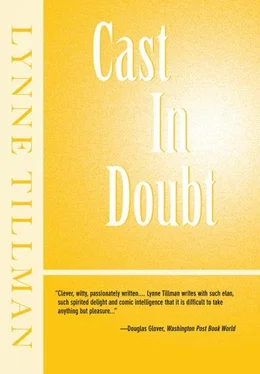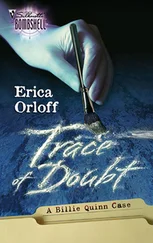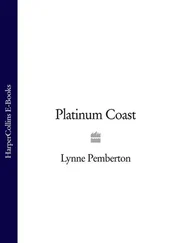I’ve never been able to admit I’ve lied, to anyone. I’d rather die, and, muddled and soft as I have become, I can’t stand her indignant scorn. Oh, Helen, I sputter, I don’t see anything wrong in my being interested in your friends and your life. It is not precisely prying.
I am appalled to hear myself sound like a father or mother. John is no friend of mine, she insists with annoyance, he wasn’t really even a boyfriend. He’s a worse liar than you. Then she pauses and asks if John is trying to move in on Alicia — to move in on rather than in with, I note. Her delivery is flat; it’s a sophisticated voice, with little inflection. It’s a voice I hadn’t yet heard, from her. I am taken aback. I visualize Helen in the city, urbanely testing her young tongue in tandem with similarly dressed girls, who sit in clubs with boys like John. They are clever and wild, the girls Gwen wrote me about. Helen may indeed have been one. When I was her age, I would have been frightened to death by people, young women, like her. It’s especially her psychological astuteness that unnerves me. She taps her cigarette on the table, and I light it for her. She looks me directly in the eye. I try not to flinch.
Helen seems to be weakening. After all, I am her only friend here, I and Chrissoula, who can’t really talk to her. But now Helen falls silent again. Her silence may deepen into a resolve not to speak. So I do, after drinking another glass of wine; I make myself vulnerable to her. Unquestionably I want to appease her.
Ultimately, Helen, I offer, in the end everyone knows everyone. I don’t know why. It must have to do with age, with how the world grows small conceptually as we grow older. We are connected whether we want to be or not. We are all connected. I toss this out, quite off the cuff, but the reasoning will serve, I hope. Then I follow with the connected notion, to my mind, that physicists deem an equation elegant when it’s executed particularly well, when it is beautiful, and that makes science close to art. Do you mean, Horace, she interjects, again in that sophisticated voice, do you mean, to you, John and I make an elegant equation?
It is not like Helen to draw paranoid conclusions. I don’t know what you mean, Helen, I answer. I am not Machiavelli. Helen agrees that I am not but goes on to remind me that I am a writer. She’s known a couple, and even had one in the family, but no one really famous. My mind races through some possibilities, but her last name — Nash — only brings me to Ogden, and I’m sure he’s not in her family. Helen may be traveling under an assumed name, carefully hiding the identity of a famous father or uncle, or grandfather. I don’t know why I need to, again I’m being impetuous, but I ask, Do I remind you of your father, Helen? She stares at me quizzically and then answers that I do, but only when I ask questions like that. He’s a shrink, she says. Helen swallows her retsina in one gulp. A shrink, I repeat after her. A horrible word, I think. A shrink, I say again. Helen adds, Children of shrinks are really fucked up. And, in the definitive way she has said this, it is as if she were bringing to a conclusion my own queries and thoughts.
I nod in agreement. It’s as if we are and are not discussing her. She has already told me that she is, as she puts it, fucked up, but now I think she’s being ironic, at least in this very moment. This is getting heavy, she says, with a half-smile. Yes, I know, Helen, we are not supposed to get heavy with each other. She laughs again — Helen often does when I use her argot.
It dawns on me that she has told me next to nothing about John and her, only that John is a liar, as am I. She is most definitely artful, and I am still curious. John was a sort of boyfriend. They are not friends. I feel more sadness welling inside me. Children leave each other without a second thought. I was; I did. All those wonderful men, those friends, lovers, and I’ll never see them again. Each face is a drop of memory that is diluted by time and dissolves; nothing rests or stays still long enough to form into a clear image. They’ve drifted away, or I did. Helen doesn’t realize how precious all those moments are, and John — how beautiful he is, with those violet eyes and soft lips. I’d hold him to me forever were he mine. I’d love to make love with John. I gaze at Helen vacantly. Perhaps. With her, too. The thought scandalizes me. Am I blanching? Would this idea horrify her? Probably not. I have learned over the years that only one’s own thoughts can ever genuinely shock one.
I swivel in my chair, pull myself up and talk to Helen pompously, as if giving a lecture. I suppose I feel the need to appear sensible and knowing, because I am wondering at myself, questioning whether my friendship with her has somehow to do with a kind of frustrated heterosexuality, though I think it hasn’t in this case. I am not attracted to her. I do accept Freud’s notion of an original bisexuality. Certainly in dreams I’ve desired men and women, even simultaneously, yet in life I rarely ever find a woman sexually attractive, sexually desirable.
I explain to Helen that art makes virtue out of necessity — the artist must do what he does; he can see no way other than the way he sees. That is vision. Science, on the other hand, makes necessity itself a virtue — that is, it says that nature is beautiful, even though it is cruel. Niels Bohr once told his colleagues, I heard, that the task of physics was “not to find out how nature is, but what we can say about nature.” This is much like writing, I go on. Physicists designate equations elegant when they serve many functions, which is part of that beauty. That is what elegance is. I’m defending my earlier assertion, and some other position, my position vis-à-vis hers, but I’m not sure what hers is, except one of disbelief. And she must never guess that I have had, even for the most minute second, a nanosecond, the slightest trace of desire for her. I would never act on it. Am I an old fool like Lear? “O heavens, if you do love old men…”
Drunk, teetering on the maudlin, I pursue an ambiguous line, but I cannot stop myself. I cannot go home now. I know I should. The white wine is gone, much of it swirling around my brain. Helen is most certainly by my side. I am close to her, but what does that mean? Am I really close to anyone? It must be the alcohol that has produced this phantasm — that I could bed her, could desire her. I feel not a trace of lust for her. It is all a product of my imagination, mental activity — an inventive kind of willfulness, in a sense.
I focus as best I can. She’s probably not concerned yet with elegance, and may never be. It’s odd how quickly one becomes or feels drunk. It’s true — to me, her father’s being a psychiatrist serves a function; Roger over there with Adonis serves another; even Alicia, who is not here, annoying, marvelous Alicia, serves a function — she appears at the wrong times, as she did in the hospital. But what function do I serve? Am I content with thinking of myself as a storyteller? Isn’t that too easy?
Wallace, who has just arrived — this I observe with a start — he serves no function whatsoever. He is inelegant. A clod. No, a succubus. The Dutchwoman is with him, propping him up, and with them an aged stooped creature whose face is covered by a beard. I squint and squint. It’s Stephen the Hermit. This is quite extraordinary, I exclaim to Helen, that man hasn’t been out in years — not in company. He was once exquisitely beautiful, so beautiful. A great beauty. How did they manage to capture him?
Helen turns to look at him and giggles, as she should. It’s as if I were describing Tarzan. Tarzan was English, wasn’t he? Stephen is English, a scion of colonialists; I would bet on that, were I a gambling man like Rhett Butler. She probably hasn’t read Gone with the Wind . She must have seen the movie. I am effervescent, giddy, and at the sight of Stephen, light-headed if not light-hearted. Words almost dance off one’s tongue when one’s mind is addled by drink.
Читать дальше












